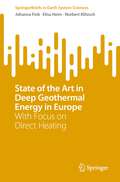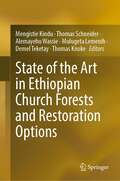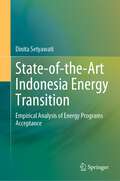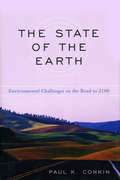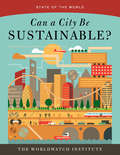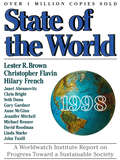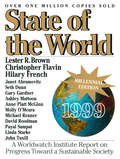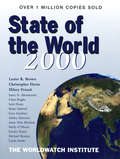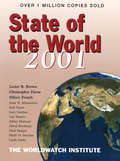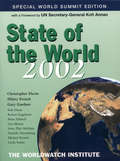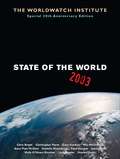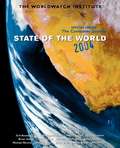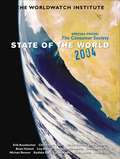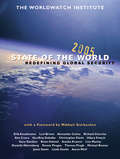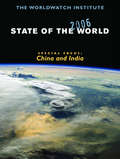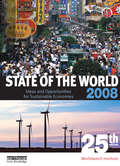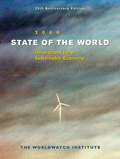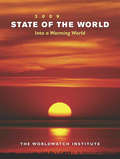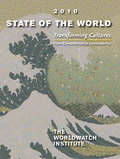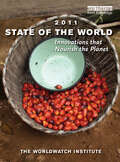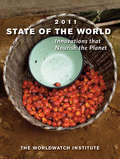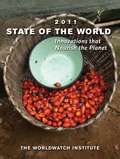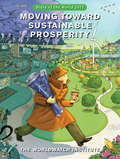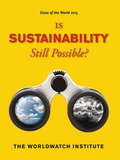- Table View
- List View
State of the Art in Deep Geothermal Energy in Europe: With Focus on Direct Heating (SpringerBriefs in Earth System Sciences)
by Johanna Fink Elisa Heim Norbert KlitzschSince nearly 50 % of Europe's energy demand is in the heating and cooling sector, it is expected that geothermal energy will play an important role in the transition to a decarbonized energy system. However, deep geothermal energy is currently harvested mainly from areas with very favorable geothermal conditions. As these areas are geographically limited, the use of geothermal energy in less favorable regions is essential for unleashing the full potential of geothermal energy, since they make up the majority of the total geothermal potential in Central Europe. Motivated by the growing interest in deep geothermal energy among, e.g., energy companies and communities, this text reviews the state of the art in deep geothermal energy with focus on direct heating in geothermally less favorable regions. It provides an overview of technologies used to generate heat from the deep underground and discusses main technical and non-technical risks associated with deep geothermal projects. The text addresses readers with an interest in geothermal energy but does not require a background in geoscience or engineering sciences. It is suitable as textbook for Geothermal Energy courses for undergraduate students from different disciplines.
State of the Art in Ethiopian Church Forests and Restoration Options
by Thomas Schneider Demel Teketay Mengistie Kindu Alemayehu Wassie Mulugeta Lemenih Thomas KnokeThis book, with contributions from leading academics - and including reviews and case studies from Ethiopian Church forests - provides a valuable reference for advanced students and researchers interested in forest and other natural resource management, ecology and ecosystem services as well as restoration options. The book addresses various aspects including a general overview of Ethiopian church forests, the present role and future challenges of church forests. It also discusses their structure and diversity in the context of sustainability and discusses restoration options for surrounding landscapes, under consideration of the circumstances of the land and the needs of surrounding communities. The intended readership includes natural resource professionals in general as well as forestry professionals in particular (practitioners, policymakers, educators and researchers). The book will provide the reader with a good foundation for understanding Ethiopian forest resources and restoration options of degraded landscape.
State-of-the-Art Indonesia Energy Transition: Empirical Analysis of Energy Programs Acceptance
by Dinita SetyawatiThis book discusses how people can come together to address current energy justice and access poverty problems by examining the relationship between energy systems and society in diverse energy sources. The novelty of this book is that this is the only complete guide for readers who wish to understand the status of Indonesia’s energy transition and renewable energy development. Energy programs that are explored are the ones prioritized by government administrations, including coal, nuclear power, solar energy, green electricity, and geothermal energy. Based on extensive fieldwork and empirical data, the book combines insights from historical data on energy subsidies and economic diversification, current empirical data on social acceptance of new energy technologies, and contemporary studies that forecast the implications of the transition to the coal industry and fossil fuel subsidies. It asks how Indonesia has enacted policies that support energy transition. How do the public and civil society view those policies? What are the implications for broader themes and discussions on energy sources, technology, systems, policies, and service? Strategies are suggested to advance a sustainable transition in the developing world that will mitigate developmental risks associated with the transition away from fossil fuels while encouraging decision making in a sustainable and socially just manner. This book is an informative and engaging read for a general audience as well as a valuable resource for scholars, researchers, and students in environmental and energy studies.
The State of the Earth: Environmental Challenges on the Road to 2100
by Paul K. ConkinThe present era of staggering scientific and technological innovations, with major changes in agriculture, manufacturing, commerce, and communications, seems to document unparalleled human achievement. Yet when we examine the long-term implications, it becomes clear that an ever-growing number of humans have threatened the delicate environmental balance that sustains life on this planet. The past century may be remembered not as a period of great progress but as one marked by unrestrained consumption and failure to come close to a sustainable use of the earth's limited natural resources. In The State of the Earth, noted historian Paul K. Conkin provides a comprehensive analysis of the many environmental hazards that humans must face in this still-young century. Our activities have threatened the survival of many plants and animals, created scarcities in cultivatable soils and water needed for irrigation, used up a large share of fossil fuels, polluted air and water, and most likely created the conditions that will lead to major climate changes. Conkin not only evaluates the challenges but recognizes the successes of concerned individuals and organizations in creating awareness and in supporting policies that will best preserve a healthy earth. The State of the Earth is an invaluable resource for those who desire a broad yet thorough and scientifically informed introduction to present environmental challenges. Even when humans possess the knowledge and the tools to cope with mounting environmental problems, they may not be willing to make the needed sacrifices. Conkin demonstrates that the issues are as much moral and political as technological.
State of the World (State of the World)
by The Worldwatch The Worldwatch InstituteCities are the world's future. Today, more than half of the global population--3. 7 billion people--are urban dwellers, and that number is expected to double by 2050. There is no question that cities are growing; the only debate is over how they will grow. Will we invest in the physical and social infrastructure necessary for livable, equitable, and sustainable cities?In the latest edition of State of the World, the flagship publication of the Worldwatch Institute, experts from around the globe examine the core principles of sustainable urbanism and profile cities that are putting them into practice. State of the World first puts our current moment in context, tracing cities in the arc of human history. It also examines the basic structural elements of every city: materials and fuels; people and economics; and biodiversity. In part two, professionals working on some of the world's most inventive urban sustainability projects share their first-hand experience. Success stories come from places as diverse as Ahmedabad, India; Freiburg, Germany; and Shanghai, China. In many cases, local people are acting to improve their cities, even when national efforts are stalled. Parts three and four examine cross-cutting issues that affect the success of all cities. Topics range from the nitty-gritty of handling waste and developing public transportation to civic participation and navigating dysfunctional government. Throughout, readers discover the most pressing challenges facing communities and the most promising solutions currently being developed. The result is a snapshot of cities today and a vision for global urban sustainability tomorrow.
State of the World 1998: A Worldwatch Institute Report On Progress Toward A Sustainable Society (State of the World)
by The Worldwatch InstituteIn this fifteenth edition of State of the World, Lester R. Brown and the Worldwatch research team look at the environmental effects of continuing economic growth as the economy outgrows the earth's ecosystem. As the global economy has expanded from $5 trillion of output in 1950 to $29 trillion in 1997, its demands have crossed many of the earth's sustainable yield thresholds
State of the World 1999: A Worldwatch Institute Report On Progress Toward A Sustainable Society (State of the World)
by The Worldwatch InstituteWritten in clear and concise language, with easy-to-read charts and tables, State of the World presents a view of our changing world that we cannot afford to ignore.
State of the World 2000: A Worldwatch Institute Report On Progress Toward A Sustainable Society (State of the World)
by The Worldwatch InstituteState of the World 2000 shines a sharp light on the great challenge our civilization faces: how to use our political systems to manage the difficult and complex relationships between the global economy and the Earth's ecosystems. If we cannot build an environmentally sustainable global economy, then we have no future that anyone would desire.
State of the World 2001
by The Worldwatch InstituteFrom the thinning of the Arctic sea ice to the invasion of the mosquito-borne West Nile virus, State of the World 2001 shows how the economic boom of the last decade has damaged natural systems. The increasingly visible evidence of environmental deterioration is only the tip of a much more dangerous problem: the growing inequities in wealth and income between countries and within countries, inequities that will generate enormous social unrest and pressure for change.
State of the World 2002 (State of the World)
by The Worldwatch InstituteState of the World 2002 includes chapters on climate change, farming, toxic chemicals, sustainable tourism, population, resource conflicts and global governance
State of the World 2003 (State of the World)
by The Worldwatch InstituteThe challenges are still immense, of course, as the book also documents, but the building blocks for a historic reinvention of human civilization are now within reach.
State of the World 2004
by Linda StarkeIt focuses on consumption-one of the most central and also one of the most neglected elements in the global search for a sustainable future.
State of the World 2004: The Consumer Society (State of the World)
by The Worldwatch InstituteWith chapters on food, water, energy, the politics of consumption and redefining the good life, Worldwatch's award-winning research team asks whether a less-consumptive society is possible--and then argues that it is essential.
State of the World 2005: Redefining Global Security (State of the World)
by The Worldwatch InstituteIn State of the World 2005, Worldwatch researchers explore underlying sources of global insecurity including poverty, infectious disease, environmental degradation, and rising competition over oil and other resources. Find out why terrorism is just symptomatic of a far broader set of complex problems that require more than a military response.
State of the World 2006: China and India (State of the World #0)
by The Worldwatch InstituteState of the World 2006 provides a special focus on China and India and their impact on the world as major consumers of resources and polluters of local and global ecosystems. The report explains the critical need for both countries to "leapfrog" the technologies, policies, and even the cultures that now prevail in many western countries for the sake of global sustainability--and reports on some of the strategies that China and India are starting to implement. Besides the focus on China and India, State of the World 2006 looks at actions corporations can take to be more socially responsible; examines the potential socioeconomic, health, and environmental implications of nanoscale technologies; assesses the impacts of large-scale development of biofuels on agriculture and the environment; describes mercury sources, industrial uses, and health hazards worldwide; and provides an overview of the need to safeguard freshwater ecosystems, with examples of proven approaches in cities, villages, and farming regions around the world.
State of the World 2007: Our Urban Future (State of the World)
by The Worldwatch InstituteIn 2008, half of the Earth's population will live in urban areas, marking the first time in history that humans are an urban species. State of the World 2007: Our Urban Future examines changes in the ways cities are managed, built, and lived in that could tip the balance towards a healthier and more peaceful urban future.
State of the World 2008: Ideas and Opportunities for Sustainable Economies
by Worldwatch InstituteThe environmentalist's bible' Times Higher Education Supplement. 'Essential reading' The Good Book Guide. 'The most comprehensive, up-to-date, and accessible summaries ... on the global environment' E. O. Wilson, Pulitzer Prize winner. Celebrating its 25th year of publication, State of the World 2008 suggests that something huge and even revolutionary is struggling to be born as policymakers, business leaders and others around the globe create the architecture of sustainable economies. Featuring chapters on renewable energy, innovations in clean production, commons resources, trade policy, finance for sustainability, new economic yardsticks, and many other topics, State of the World 2008 is the first global-level publication to showcase a wide range of diverse innovations and to demonstrate their near-term potential to put whole societies on a sustainable path. Published annually in 28 languages, State of the World is relied upon by national governments, UN agencies, development workers and law-makers for its authoritative and up-to-the-minute analysis and information. It is essential for anyone concerned with building a positive, global future.
State of the World 2008: Innovations for a Sustainable Economy (State of the World)
by The Worldwatch InstituteEnvironmental issues were once regarded as irrelevant to economic activity, but today they are dramatically rewriting the rules for business, investors, and consumers. Around the world, innovative responses to climate change and other environmental problems are affecting more than $100 billion in annual capital flows as pioneering entrepreneurs, organizations, and governments take steps to create the Earth's first "sustainable" global economy.
State of the World 2009: Into a Warming World
by The Worldwatch InstituteIt's New Year's Day, 2101. Somehow, humanity survived the worst of global warming--the higher temperatures and sea levels and the more intense droughts and storms--and succeeded in stabilizing the Earth's climate. Greenhouse gas concentrations are peaking and are expected to drift downward in the 22nd century. The rise in global temperatures is slowing and the natural world is gradually healing. The social contract largely held. And humanity as a whole is better fed, healthier, and more prosperous today than it was a century ago. This scenario of an imagined future raises a key question: What must we do in the 21st century to make such a future possible, and to head off the kind of climate catastrophe that many scientists now see as likely? This question inspires the theme of the Worldwatch Institute's State of the World 2009 report: how climate change will play out over the coming century, and what steps we most urgently need to take now.
State of the World 2010: Transforming Cultures From Consumerism to Sustainability (State of the World)
by The Worldwatch InstituteLike a tsunami, consumerism has engulfed human cultures and Earth's ecosystems. Left unaddressed, we risk global disaster. But if we channel this wave, intentionally transforming our cultures to center on sustainability, we will not only prevent catastrophe, but may usher in an era of sustainability--one that allows all people to thrive while protecting, even restoring, Earth. In State of the World 2010, sixty renowned researchers and practitioners describe how we can harness the world's leading institutions--education, the media, business, governments, traditions, and social movements--to reorient cultures toward sustainability.
State of the World 2011: Innovations that Nourish the Planet
by Worldwatch InstituteOver the last two years, Worldwatch's Nourishing the Planet team has travelled to 25 sub-Saharan African nations - the places where hunger is greatest - and uncovered a treasure trove of innovations from farmers groups, private voluntary organizations, universities, and even agribusiness companies. These innovations offer global benefits - from the continent's role in preventing disastrous climate change to the way urban farmers are feeding people in cities and why even determined locavores are sustained by the crop diversity preserved by farmers thousands of miles away. This book assesses the state of agricultural innovations from cropping methods to irrigation technology to agricultural policy with an emphasis on sustainability, diversity, and ecosystem health in the hope of guiding governments, foundations, and concerned citizens in their efforts to eradicate hunger and poverty. Published annually in 28 languages, State of the World is long established as the most authoritative and accessible annual guide to our progress towards a sustainable future. It is relied upon by national governments, UN agencies, development workers and law-makers for its up-to-the-minute analysis and information.
State of the World 2011: Innovations that Nourish the Planet (State of the World)
by The Worldwatch InstituteA compelling look at the global food crisis, with particular emphasis on global innovations that can help solve a worldwide problem. State of the World 2011 not only introduces us to the latest agro-ecological innovations and their global applicability but also gives broader insights into issues including poverty, international politics, and even gender equity.
State of the World 2011: Innovations That Nourish the Planet
by Worldwatch Institute StaffKnown for tackling the most pressing issues that face our world, the Worldwatch Institute has dedicated the 2011 edition of its flagship report to a compelling look at the global food crisis, with particular emphasis on what innovators globally can do to help solve a worldwide problem. State of the World 2011 not only introduces us to the latest agro-ecological innovations and their global applicability but also gives broader insights into issues including poverty, international politics, and even gender equity. Written in clear, concise language, with easy-to-read charts and tables, State of the World 2011, produced with support from the Bill and Melinda Gates Foundation, provides a practical vision of the innovations that will allow billions of people to feed themselves, while restoring rural economies, creating livelihoods, and sustaining the natural resource base on which agriculture depends.
State of the World 2012: Moving Toward Sustainable Prosperity (State of the World)
by The The Worldwatch InstituteIn the 2012 edition of its flagship report, Worldwatch celebrates the twentieth anniversary of the 1992 Earth Summit with a far-reaching analysis of progress toward building sustainable economies. Written in clear language with easy-to-read charts, State of the World 2012 offers a new perspective on what changes and policies will be necessary to make sustainability a permanent feature of the world's economies. The Worldwatch Institute has been named one of the top three environmental think tanks in the world by the University of Pennsylvania's Think Tanks and Civil Societies Program.
State of the World 2013: Is Sustainability Still Possible?
by The Worldwatch InstituteEvery day, we are presented with a range of "sustainable" products and activities--from "green" cleaning supplies to carbon offsets--but with so much labeled as "sustainable," the term has become essentially sustainababble, at best indicating a practice or product slightly less damaging than the conventional alternative. Is it time to abandon the concept altogether, or can we find an accurate way to measure sustainability? If so, how can we achieve it? And if not, how can we best prepare for the coming ecological decline? In the latest edition of Worldwatch Institute's State of the World series, scientists, policy experts, and thought leaders tackle these questions, attempting to restore meaning to sustainability as more than just a marketing tool. In State of the World 2013: Is Sustainability Still Possible?, experts define clear sustainability metrics and examine various policies and perspectives, including geoengineering, corporate transformation, and changes in agricultural policy, that could put us on the path to prosperity without diminishing the well-being of future generations. If these approaches fall short, the final chapters explore ways to prepare for drastic environmental change and resource depletion, such as strengthening democracy and societal resilience, protecting cultural heritage, and dealing with increased conflict and migration flows. State of the World 2013 cuts through the rhetoric surrounding sustainability, offering a broad and realistic look at how close we are to fulfilling it today and which practices and policies will steer us in the right direction. This book will be especially useful for policymakers, environmental nonprofits, and students of environmental studies, sustainability, or economics.
